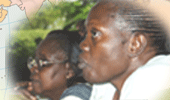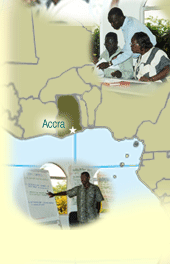
Strengthening Midwives’ Counseling in Adolescent Reproductive Health
In response to a 1997 needs assessment of Ghana Registered Midwives Association (GRMA) members, PRIME I developed a self-directed learning (SDL) approach to improve midwives’ family planning and reproductive health (FP/RH) knowledge, counseling skills and client-provider interaction (CPI) in order to increase access to services for adolescents. Designed to minimize the time midwives’ spend away from their facilities for training, the six-month SDL course responded to the distinct learning needs of private-sector providers. During a pilot project in 1999, 59 midwives from the regions of Brong Ahafo, Eastern and Ashanti participated in the course. PRIME II supported the development of an additional module on HIV/AIDS counseling and testing that was used by the GRMA to train an additional 52 midwives in 2001-2002.
Key Results: A June 2002 evaluation of 43 of the 52 midwives trained in 2001-2002 used observations of simulated exchanges to compare post-intervention and baseline mean scores of their performance in various aspects of CPI related to serving adolescent clients. The midwives showed only slight improvement in the two areas of CPI skills in which they had scored highest at baseline, Establishing Rapport (87% vs. 86%) and Gathering Information and Listening (68% vs. 67%). However, significant gains were made in areas where their skills needed more improvement: Providing Information and Explanation (78% vs. 50%), Decision Making and Problem Solving (69.5% vs. 30%) and Planning Next Steps (76.5% vs. 36%). Overall post-intervention and baseline CPI scores for these midwives (77% vs. 54%) were very similar to the results from the pilot intervention (74% vs. 54%, n=30).
Self-Paced Learning in Postabortion Care/Safe Motherhood
PRIME II also worked with the Ghana Health Services (GHS) of the Ministry of Health to design and implement a self-paced learning (SPL) approach in postabortion care (PAC)/safe motherhood as an alternative to their traditional group-based classroom training for doctors, nurses and midwives. The GHS Health Research Unit, with support from Population Council/FRONTIERS II and PRIME, conducted operations research to compare the two approaches in terms of outcome, impact and costs; PRIME led the cost-effectiveness analysis component of the study.
Key Results: While the financial costs of the SPL approach are about 14% higher than the traditional approach, analysis documented that gains in learning and service delivery are accomplished in a less costly manner through SPL. SPL learners (n=40) showed 25-49% higher knowledge and skills gains and 4.5-6% higher performance gains in simulated service delivery (with the largest increase in PAC) than participants in traditional training (n=40). When examining client outcomes and service delivery before and after training, the SPL group showed relatively high increases, ranging from 34.5% for new and continuing use of injectables to 314.5% for new and continuing use of condoms. The traditional training group showed an increase only for use of condoms (18%).
Improving the Performance of Regional
Resource Teams
As part of GHS’ efforts to scale-up reproductive health services, Regional Resource Teams (RRTs) in safe motherhood were established to conduct life-saving skills and postabortion care (LSS/PAC) training for midwives and supervise and support application of these new skills. After it became apparent that many RRT members were not performing to standard, PRIME II assisted GHS in using the Performance Improvement (PI) approach to conduct a performance needs assessment and implement interventions including training, supportive supervision and ensuring adequate equipment and supplies.
Key Results: An evaluation revealed marked improvements in the performance of RRT members, including gains in performing their designated roles (87.5% vs. 36% at baseline, n=40, n=42) and providers receiving supervisory visits (67% vs. 40%, n=72, n=83) and being told their job expectations (97% vs. 31%, n=72, n=83).
Supporting Community-Based Health Planning
and Services
PRIME II played a leadership role in supporting GHS’ expansion of its Community-Based Health Planning and Services (CHPS) project from a successful pilot activity to a nationwide strategy to reach underserved populations with FP/RH services. PRIME expedited the scale-up of CHPS by assisting with clinical training, Performance Improvement, and supportive supervision approaches and materials. As part of this effort, PRIME assessed CHPS scale-up costs and produced financial information that had not previously been available to GHS planners. PRIME worked in a sample of 16 CHPS zones from five of Ghana’s ten regions, collaborating with stakeholders to develop data collection tools and gather cost data on start-up activities and placement of Community Health Officers (CHOs) that occurred in 2000, and costs of service delivery by CHOs in 2001.
Key Results: The cost data produced by this analysis provided the basis for serious and overdue policy dialogue on issues related to the level of CHPS implementation. The data served as a “reality check” to GHS planners and partners and are being used to formulate policy decisions such as the need to downsize implementation goals or encourage adaptation of lower cost scale-up strategies (for example, renovation of buildings versus new construction).
Saving Newborn Lives Initiative
In the course of PRIME II’s assistance to GHS to support safe motherhood activities, a deficiency in comprehensive newborn care came to the attention of project staff. With core-funded assistance from PRIME, GHS implemented a Saving Newborn Lives (SNL) initiative in the Central and Western regions from September 2003 through May 2004. PRIME supporting institution Save the Children’s Essential Newborn Care curriculum was adapted for the Ghanaian context and incorporated into ongoing safe motherhood training for midwives. Master trainers and Regional Resource Teams reviewed the curriculum and chose areas to add to the existing safe motherhood curriculum. The master trainers then conducted orientation sessions in training methodologies for the RRTs to enable them to more effectively train midwives in SNL.
Key Results: Providers’ knowledge scores improved from 70% pre-training (n=17) to 85% post-training (n=17) and 82% at final evaluation (n=15). RRT members’ knowledge scores also showed improvement, from 83% pre-training (n=16) to 91% post-training (n=16) and 85% at final evaluation (n=12). Provider skills in newborn resuscitation vastly improved as a result of the training (from 12% to 59%, n=17); however, the level of skills was not sustained at final evaluation (31%, n=13). The project team attributed this drop to providers not being able to apply their skills due to the lack of needed kits and equipment at their facilities and to inadequate post-training support from the RRTs.
|











